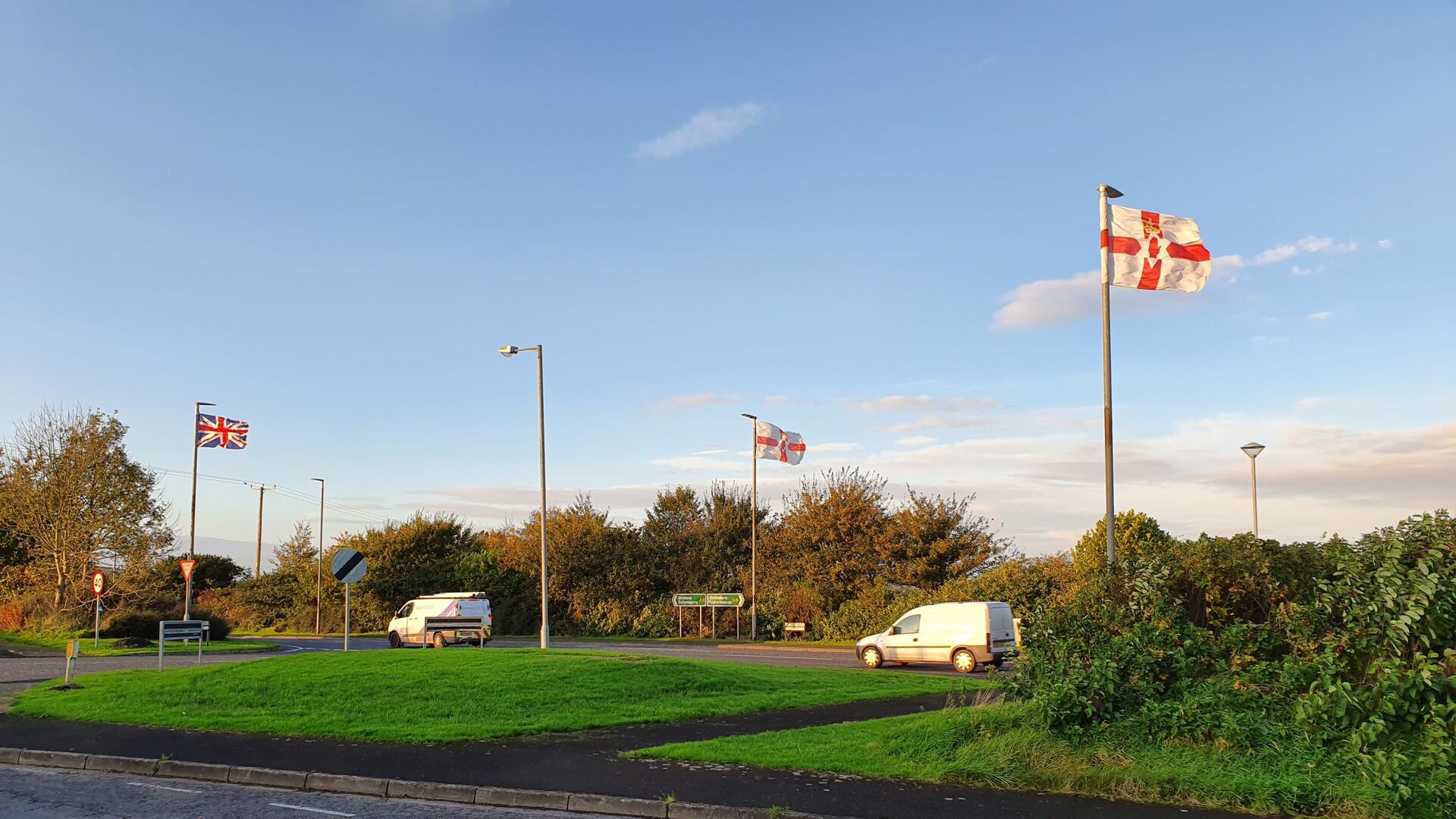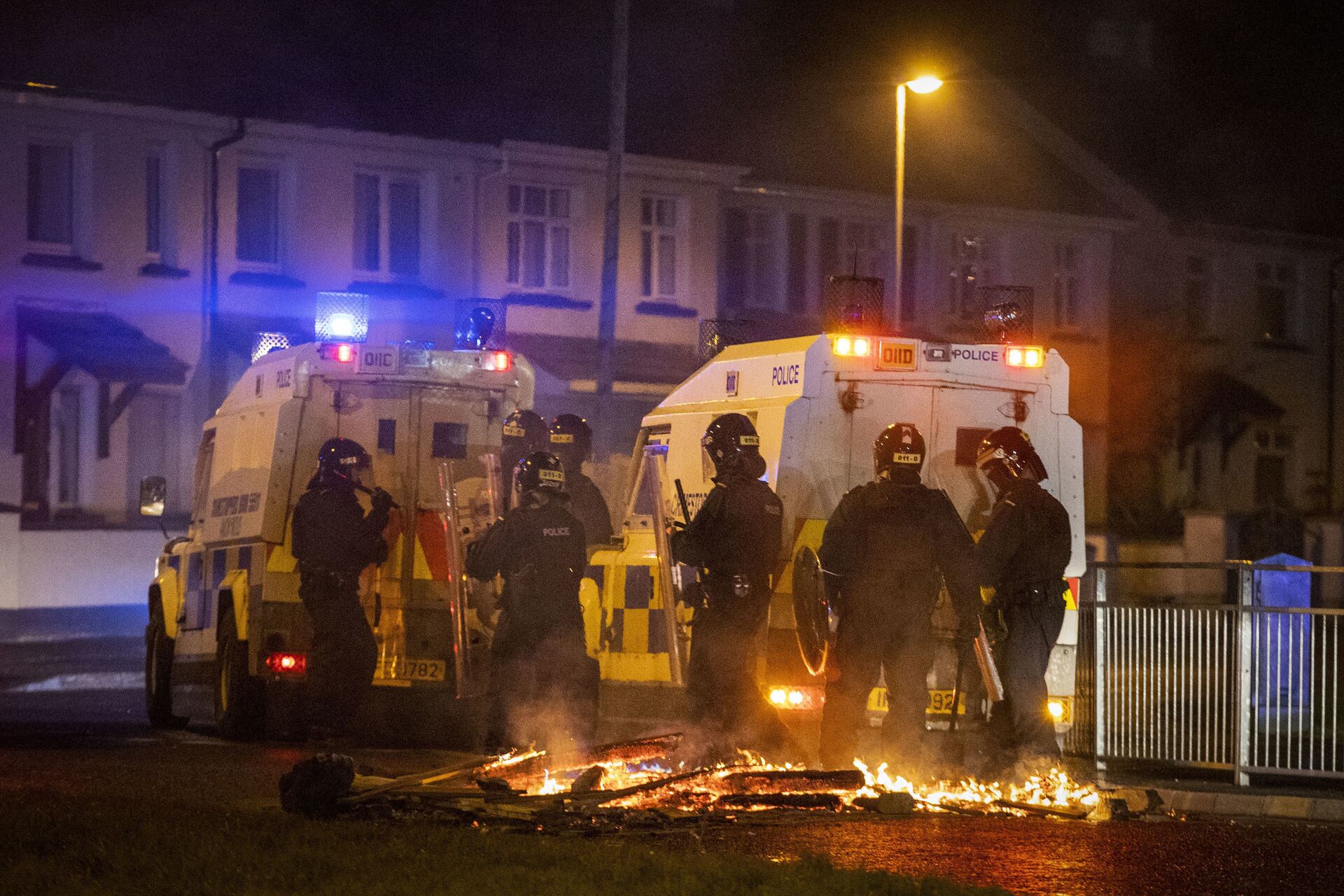https://sputnikglobe.com/20211103/bus-attack-by-protestant-action-force-opposed-to-northern-ireland-protocol-very-worrying---expert-1090449295.html
Bus Attack by Protestant Action Force Opposed to Northern Ireland Protocol ‘Very Worrying’ - Expert
Bus Attack by Protestant Action Force Opposed to Northern Ireland Protocol ‘Very Worrying’ - Expert
Sputnik International
Fresh negotiations are underway between Britain and the European Union over the controversial Northern Ireland Protocol. But who is the shadowy loyalist... 03.11.2021, Sputnik International
2021-11-03T15:28+0000
2021-11-03T15:28+0000
2022-03-01T12:20+0000
northern ireland
brexit
brandon lewis
uvf
northern ireland protocol
https://cdn1.img.sputnikglobe.com/img/107707/67/1077076745_0:0:2730:1537_1920x0_80_0_0_e6f17db30710e292537a25aa906c671d.jpg
An expert on the pro-British Protestant loyalist identity in Northern Ireland has described an attack on a bus earlier this week as “very worrying”.On Monday, 1 November, two armed and masked men hijacked an empty bus in the Northern Irish town of Newtownards, ordered the driver to get out, and then set it on fire.The Belfast Telegraph reported the driver had heard the men referring to the Northern Ireland Protocol before torching the bus.The UK government’s Northern Ireland secretary, Brandon Lewis, said the incident was "beyond despicable".Responsibility for the attack was claimed by the Protestant Action Force, a moniker which was used during The Troubles as a cover name by the Ulster Volunteer Force (UVF), one of two loyalist paramilitary groups.Connal Parr, a senior lecturer in History at Northumbria University, said: “This name has a history of usage as a cover name by the UVF and it was used from the mid-1970s right up until the mid-90s and was used during the murder of 41 Catholic victims, so it suggests a continuum with loyalist paramilitaries during The Troubles”.More than 3,600 people suffered violent deaths during The Troubles - 30 years of sectarian strife in Northern Ireland, which was ended by the Good Friday Agreement.The Provisional IRA and the smaller INLA drew their support from the Catholic community, who wanted a united Ireland, while the UVF and the Ulster Defence Association (UDA) represented the loyalist Protestant community who wanted to remain part of the UK.Professor Parr, author of Inventing the Myth: Political Passions and the Ulster Protestant Imagination, said the Newtownards incident was “very worrying indeed” and that there was no doubt the Northern Ireland Protocol had stirred up the loyalist community.He said there had been fears loyalist violence would occur over the summer, but it did not happen. However, he added: “It’s pretty ominous”.When the Brexit deal was negotiated with the EU by Boris Johnson’s government in 2019, a compromise - known as the Northern Ireland Protocol - was put in place which placed the whole island of Ireland in the single market and introduced a customs border in the Irish Sea.The Brexit secretary, Lord Frost, has asked for the protocol to be renegotiated amid widespread protests among the unionist and loyalist community in Northern Ireland.Prof Parr said Brexit had “completely shifted” the perception of a united Ireland among many people and this had increased loyalist and unionist fears.He said it was “extraordinary” that the gunmen mentioned the protocol, adding that the Newtownards incident should be seen as “warning shot across the bow” by disgruntled former members of the UVF.In October 2019, Paul, a former Irish republican paramilitary who served time for possessing petrol bombs, told Sputnik: “The loyalist paramilitaries will start killing Catholics if a united Ireland ever looks likely. They are still there and they are up to their necks in drugs and drug dealing. When their backs are against the wall they always carry out sectarian killings”.Asked what the Protestant Action Force might target next, Prof Parr said: “They wouldn’t attack British government institutions but possibly buildings related to the Irish government or anything to do with the European Union”.He said “low-level activity” could be expected from loyalists and could resemble the continuing actions of some dissident Irish republicans which are still “humming” in the background in Northern Ireland.Prof Parr said he was worried about the younger generation from loyalist communities, who he said have a grudging respect for those who were in the UVF and UDA.
northern ireland
Sputnik International
feedback@sputniknews.com
+74956456601
MIA „Rossiya Segodnya“
2021
Sputnik International
feedback@sputniknews.com
+74956456601
MIA „Rossiya Segodnya“
News
en_EN
Sputnik International
feedback@sputniknews.com
+74956456601
MIA „Rossiya Segodnya“
Sputnik International
feedback@sputniknews.com
+74956456601
MIA „Rossiya Segodnya“
northern ireland, brexit, brandon lewis, uvf, northern ireland protocol
northern ireland, brexit, brandon lewis, uvf, northern ireland protocol
Bus Attack by Protestant Action Force Opposed to Northern Ireland Protocol ‘Very Worrying’ - Expert
15:28 GMT 03.11.2021 (Updated: 12:20 GMT 01.03.2022) Fresh negotiations are underway between Britain and the European Union over the controversial Northern Ireland Protocol. But who is the shadowy loyalist paramilitary group opposed to the protocol that emerged this week?
An expert on the pro-British Protestant loyalist identity in Northern Ireland has described an attack on a bus earlier this week as “very worrying”.
On Monday, 1 November, two armed and masked men hijacked an empty bus in the Northern Irish town of Newtownards, ordered the driver to get out, and then set it on fire.
The
Belfast Telegraph reported the driver had heard the men referring to the Northern Ireland Protocol before torching the bus.
The UK government’s Northern Ireland secretary, Brandon Lewis, said the incident was "beyond despicable".
Responsibility for the attack was claimed by the Protestant Action Force, a moniker which was used during
The Troubles as a cover name by the Ulster Volunteer Force (UVF), one of two loyalist paramilitary groups.
Connal Parr, a senior lecturer in History at Northumbria University, said: “This name has a history of usage as a cover name by the UVF and it was used from the mid-1970s right up until the mid-90s and was used during the murder of 41 Catholic victims, so it suggests a continuum with loyalist paramilitaries during The Troubles”.
More than 3,600 people suffered violent deaths during The Troubles - 30 years of sectarian strife in Northern Ireland, which was ended by the Good Friday Agreement.
The Provisional IRA and the smaller INLA drew their support from the Catholic community, who wanted a united Ireland, while the UVF and the Ulster Defence Association (UDA) represented the loyalist Protestant community who wanted to remain part of the UK.
Professor Parr, author of Inventing the Myth: Political Passions and the Ulster Protestant Imagination, said the Newtownards incident was “very worrying indeed” and that there was no doubt the Northern Ireland Protocol had stirred up the loyalist community.
He said there had been fears loyalist violence would occur over the summer, but it did not happen. However, he added: “It’s pretty ominous”.
When the Brexit deal was negotiated with the EU by Boris Johnson’s government in 2019, a compromise - known as the Northern Ireland Protocol - was put in place which placed the whole island of Ireland in the single market and introduced a customs border in the Irish Sea.
The Brexit secretary, Lord Frost, has asked for the protocol to be renegotiated amid widespread protests among the unionist and loyalist community in Northern Ireland.
Prof Parr said: “There is a level of panic gripping loyalist groups and certainly among unionist politicians but it was good to see quick condemnation of this incident".
Jeffrey Donaldson, leader of the Democratic Unionist Party, said: "There was never any justification for masked gunmen on the streets of Northern Ireland and there never will be”.
Prof Parr said Brexit had “completely shifted” the perception of a united Ireland among many people and this had increased loyalist and unionist fears.
He said it was “extraordinary” that the gunmen mentioned the protocol, adding that the Newtownards incident should be seen as “warning shot across the bow” by disgruntled former members of the UVF.
In October 2019, Paul, a former Irish republican paramilitary who served time for possessing petrol bombs,
told Sputnik: “The loyalist paramilitaries will start killing Catholics if a united Ireland ever looks likely. They are still there and they are up to their necks in drugs and drug dealing. When their backs are against the wall they always carry out sectarian killings”.
Asked what the Protestant Action Force might target next, Prof Parr said: “They wouldn’t attack British government institutions but possibly buildings related to the Irish government or anything to do with the European Union”.
He said “low-level activity” could be expected from loyalists and could resemble the continuing actions of some dissident Irish republicans which are still “humming” in the background in Northern Ireland.
Prof Parr said he was worried about the younger generation from loyalist communities, who he said have a grudging respect for those who were in the UVF and UDA.
“The Troubles were brutal and destabilising but for many of these youngsters it was a cool period and they see themselves now on the back foot”, said Prof Parr.


